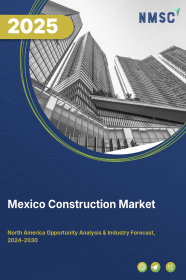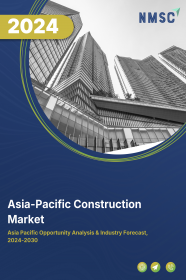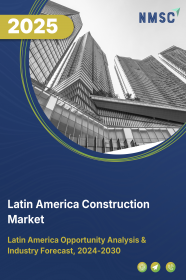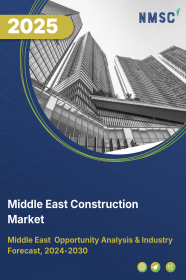
Mexico Construction Market by Type (Renovation, and New Construction), by Sector (Real Estate and Others), by Construction Method (Traditional Construction, Prefabricated/Modular Construction, 3D Printed Construction, Green/Sustainable Construction), and by Type of Contractor (Large Contractor, Medium Contractor and Small Contractor) – Country Industry Trends and Forecast, 2025–2030
Industry: Construction & Manufacturing | Publish Date: 21-Jun-2025 | No of Pages: 153 | No. of Tables: 117 | No. of Figures: 62 | Format: PDF | Report Code : CM2196
Mexico Construction Industry Overview
The Mexico Construction Market size was valued at USD 341.44 billion in 2024, and is projected to grow to USD 392.09 billion by 2025. Additionally, the industry is expected to continue its growth trajectory, reaching USD 604.58 billion by 2030, with a CAGR of 9% from 2025 to 2030.
The market is gaining strong momentum, driven by the expansion of manufacturing and industrial plants alongside major engineering and infrastructure projects that are reshaping the nation's development landscape. This upward trend reflects a broader commitment to advancing the country’s industrial and urban infrastructure.
At the same time, the industry is embracing digital transformation through the adoption of Building Information Modeling (BIM) and other advanced technologies, which are enhancing design precision, collaboration, and operational efficiency. These advancements are creating promising opportunities for sustained growth and modernization across Mexico's construction sector.
Surge in Growth of Manufacturing and Industrial Plants Drive the Mexico Construction Market Growth
The development of new manufacturing and industrial plants in Mexico is acting as a catalyst for the Mexico construction market demand. According to Business Monitor International (BMI), Mexico's infrastructure sector is expected to continue its rebound with a growth rate of 1.1% in 2024 and an average annual growth rate of 2.8% from 2024 to 2032. This projected trajectory reflects a positive outlook for stability and long-term expansion in the country’s infrastructure market.
Large-Scale Engineering and Infrastructure Projects Boosts the Mexico Construction Market Trends
Mexico construction market is also witnessing significant momentum, driven by increased investment in major engineering and infrastructure projects. Prominent developments in 2024 include the Baja California Sur Combined Cycle Power Plant (327 MW), Tigres Football Club Stadium, Lerdo-Norte IV Combined Cycle Power Plant (350 MW), Marin Prefabricated Straight Beams Production Plant, and the expansion of the Chihuahua Ophthalmic Lenses and Frames Manufacturing Plant. These landmark projects are instrumental in advancing the country’s infrastructure development and supporting market growth.
Regulatory Complexities Impede the Mexico Construction Market Expansion
The construction market in Mexico grapples with significant challenges arising from stringent regulatory frameworks. Infrastructure ventures face obstacles due to the intricate network of government regulations and permitting processes.
Infrastructure projects typically entail securing numerous permits and approvals from governmental bodies at local, regional, and national levels. These permissions encompass zoning regulations, environmental assessments, compliance with building codes, safety standards, and various regulatory requirements.
Lengthy permit acquisition processes, bureaucratic inefficiencies, and regulatory disparities among jurisdictions can significantly prolong project timelines and inflate costs. Additionally, fluctuations in regulations or unexpected policy changes can disrupt ongoing projects and discourage potential investments.
For instance, the United States Environmental Protection Agency (EPA) oversees various aspects of the infrastructure sector, including air quality, lead management, waste disposal, and water regulations. The EPA's compliance assistance centers offer resources to facilitate environmental compliance during demolition activities, the recycling of infrastructure materials, and the proper disposal of refrigeration and air-conditioning equipment.
Integration of Digitalization and BIM Presents Lucrative Opportunity for the Market Expansion
The Mexico construction market is experiencing a major digital shift, largely fueled by the growing adoption of Building Information Modeling (BIM), which is unlocking new opportunities for growth. BIM facilitates digital design, simulation, and infrastructure management, enhancing accuracy, teamwork, and resource efficiency.
In line with this trend, ALLPLAN introduced Allplan 2024-1 in April 2024, aimed at boosting BIM functionality and optimizing cloud-based workflows highlighting the industry's movement toward fully digital project execution. Additionally, the integration of AI, IoT, and cloud technologies is enabling real-time collaboration, predictive maintenance, and more effective facility management.
Competitive Landscape
The key players operating in the Mexico construction industry include CICSA, IDEAL, Mota-Engil México, Techint Ingeniería y Construcción, Grupo Omega, Pinfra, Aleatica, Grupo Indi, Grupo GP, Grupo Carso, Coconal, Grupo México, Javer, Constructora y Edificadora GIA +A, HYC Group, S.A. de C.V, and others.
Mexico Construction Market Key Segments
By Type
-
Renovation
-
New Construction
By Sector
-
Real Estate
-
Residential
-
Affordable
-
Luxury
-
-
Commercial
-
Retail Buildings
-
Office Buildings
-
Hospitality
-
Healthcare Facilities
-
Educational Institutes
-
Entertainment Ventures
-
-
-
Infrastructure
-
Transportation
-
Airport
-
Port
-
Rail
-
Road
-
-
Water and Wastewater
-
Energy
-
Telecommunication
-
-
Industrial
-
Manufacturing Plant
-
Warehouses
-
Power Plants
-
Oil Refineries
-
Chemical Plants
-
By Construction Method
-
Traditional Construction
-
Prefabricated/Modular Construction
-
3D Printed Construction
-
Green/Sustainable Construction
By Type of Contractor
-
Large Contractor
-
Medium Contractor
-
Small Contractor
Key Players
-
CICSA
-
IDEAL
-
Mota-Engil México
-
Techint Ingeniería y Construcción
-
Grupo Omega
-
Pinfra
-
Aleatica
-
Grupo Indi
-
Grupo GP
-
Grupo Carso
-
Coconal
-
Grupo México
-
Javer
-
Constructora y Edificadora GIA +A
-
HYC Group, S.A. de C.V.
REPORT SCOPE AND SEGMENTATION:
|
Parameters |
Details |
|
Market Size in 2024 |
USD 341.44 Billion |
|
Revenue Forecast in 2030 |
USD 604.58 Billion |
|
Growth Rate |
CAGR of 9% from 2025 to 2030 |
|
Analysis Period |
2024–2030 |
|
Base Year Considered |
2024 |
|
Forecast Period |
2025–2030 |
|
Market Size Estimation |
Billion (USD) |
|
Growth Factors |
|
|
Companies Profiled |
15 |
|
Market Share |
Available for 10 companies |
|
Customization Scope |
Free customization (equivalent up to 80 working hours of analysts) after purchase. Addition or alteration to country, regional, and segment scope. |
|
Pricing and Purchase Options |
Avail customized purchase options to meet your exact research needs. |

















 Speak to Our Analyst
Speak to Our Analyst

















